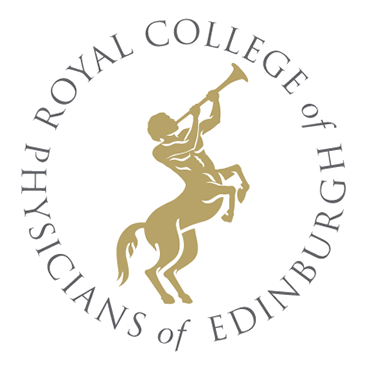
The Consultation Letters of Dr William Cullen (1710-1790) at the Royal College of Physicians of Edinburgh
[ID:1863] From: Mr John Walker / To: Dr William Cullen (Professor Cullen) / Regarding: Mr Thomson (of Kirkcudbright) (Patient) / 1 June 1780 / (Incoming)
Letter from John Walker concerning the case of Mr Thomson, whose case he does not think is spasmodic. He identifies 'symptoms of Phlegemone' and concludes that 'inflammatory affection, is of the Rheumatic kind, (perhaps the 'Pleurodyne Plethorica' of Sauvages) attended with Hectica'. Handstamp present, but unclear (possibly Gatehouse of Fleet?).
- Facsimile
- Normalized Text
- Diplomatic Text
- Metadata
- Case
- People
- Places
Facsimile
There are 4 images for this document.
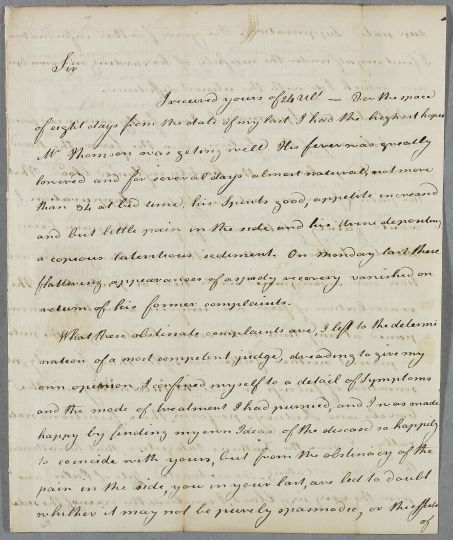
[Page 1]
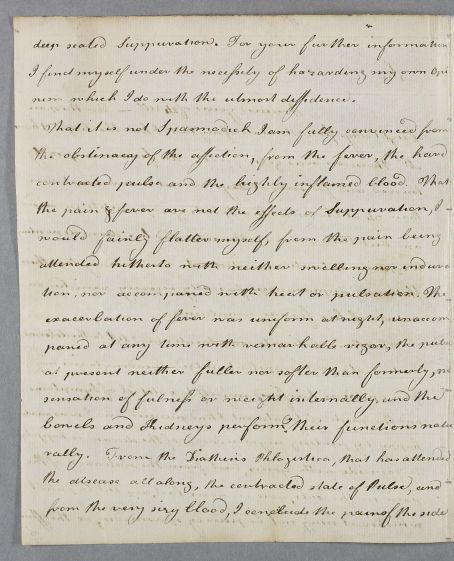
[Page 2]
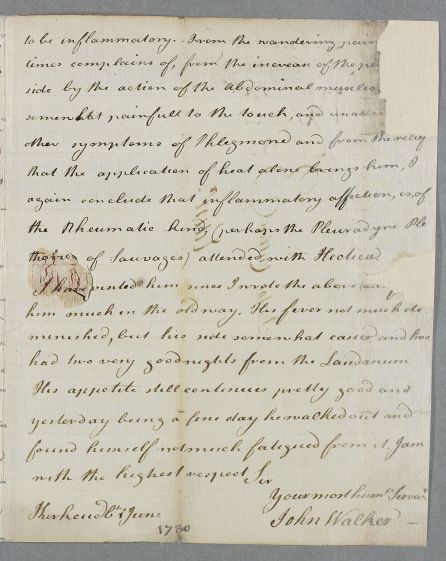
[Page 3]
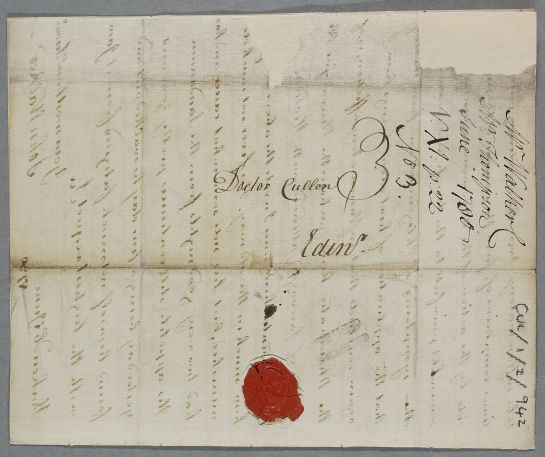
[Page 4]
Metadata
| Field | Data |
|---|---|
| DOC ID | 1863 |
| RCPE Catalogue Number | CUL/1/2/942 |
| Main Language | English |
| Document Direction | Incoming |
| Date | 1 June 1780 |
| Annotation | None |
| Type | Authorial original |
| Enclosure(s) | No enclosure(s) |
| Autopsy | No |
| Recipe | No |
| Regimen | No |
| Letter of Introduction | No |
| Case Note | No |
| Summary | Letter from John Walker concerning the case of Mr Thomson, whose case he does not think is spasmodic. He identifies 'symptoms of Phlegemone' and concludes that 'inflammatory affection, is of the Rheumatic kind, (perhaps the 'Pleurodyne Plethorica' of Sauvages) attended with Hectica'. Handstamp present, but unclear (possibly Gatehouse of Fleet?). |
| Manuscript Incomplete? | No |
| Evidence of Commercial Posting | Yes |
Case
Cases that this document belongs to:
| Case ID | Description | Num Docs |
|---|---|---|
| [Case ID:1232] |
Case of Mr Thomson (under care of John Walker) who suffers a severe hectic fever with diarrhoea. |
8 |
People linked to this document
| Person ID | Role in document | Person |
|---|---|---|
| [PERS ID:838] | Author | Mr John Walker |
| [PERS ID:1] | Addressee | Dr William Cullen (Professor Cullen) |
| [PERS ID:837] | Patient | Mr Thomson (of Kirkcudbright) |
| [PERS ID:1] | Patient's Physician / Surgeon / Apothecary | Dr William Cullen (Professor Cullen) |
| [PERS ID:838] | Patient's Physician / Surgeon / Apothecary | Mr John Walker |
| [PERS ID:1629] | Other Physician / Surgeon | Dr Francois Boissier de Sauvages de Lacroix (Sauvages, Sauvage) |
Places linked to this document
| Role in document | Specific Place | Settlements / Areas | Region | Country | Global Region | Confidence |
|---|---|---|---|---|---|---|
| Place of Writing | Kirkcudbright | Borders | Scotland | Europe | certain | |
| Destination of Letter | Edinburgh | Edinburgh and East | Scotland | Europe | certain | |
| Place of Handstamp | Gatehouse of Fleet | Borders | Scotland | Europe | inferred |
Normalized Text
I received yours of 24 Ult. 1 –– For the space
of eight days from the date of my last I had the highest hopes
Mr Thomson was geting well. His fever was greatly
lowered and for several days almost natural, not more
than 84 at bed time, his spirits good, appetite increased
and but little pain in his side and his urine depositing
a copious lateritious sediment. On Monday last these
following appearances of a speedy recovery vanished on
return of his former complaints.
What these obstinate complaints are, I left to the determi¬
nation of a most competent judge, dreading to give my
own opinion, I confined myself to a detail of symptoms
and the mode of treatment I had pursued, and I was made
happy by finding my own Ideas of the disease so happily
to coincide with yours, but from the obstinacy of the
pain in the side, you in your last, are led to doubt
whither it may not be purely spasmodic, or the effects
of
[Page 2]
deep seated suppuration. For your further information
I find myself under the necessity of hazarding my own opi¬
nion which I do with the utmost diffidence.
That it is not spasmodic I am fully convinced from
the obstinacy of the affection, from the fever, the hard
contracted pulse and the highly inflamed blood. That
the pain & fever are not the effects of suppuration, I
would fainly flatter myself, from the pain being
attended hitherto with neither swelling nor indura¬
tion, nor accompanied with heat or pulsation. The
exacerbation of fever was uniform at night, unaccom¬
panied at any time with remarkable rigor, the pulse
at present neither fuller nor softer than formerly, no
sensation of fullness or weight internally, and the
bowels and Kidneys performing their functions natu¬
rally. From the Diathesis Phlogistica, that has attended
the disease all along, the contracted state of Pulse, and
from the very sizy blood, I conclude the pains of the side
[Page 3]
to be inflammatory. From the wandering pain[s he some¬]
times complains of, from the increase of the pai[n in the]
side by the action of the abdominal muscles
somewhat painfull to the touch, and unatten[ded by]
other symptoms of Phlegemone and from the relief
that the application of heat alone brings him, I
again conclude that inflammatory affection, is of
the Rheumatic kind, (perhaps the Pleurodyne Ple¬
thorica of Sauvages) 2 attended with Hectica.
I have visited him since I wrote the above an[d] f[ound]
him much in the old way. His fever not much de¬
minished,but his side somewhat easier and has
had two very good nights from the Laudanum
His appetite still continues pretty good and
yesterday being a fine day he walked out and
found himself not much fatigued from it. I am
with the highest respect
Your most humble Servan↑t↑
1780
[Page 4]
Doctor Cullen
Edinburgh
Mr Walker C
Mr Thompson.
June 1780
V. XI, p. 22
№ 3.
Notes:
1: "Last".
2: Francois Boissier de la Croix de Sauvages (1706-1767), a French physician and author of Nosologia Methodica (1763), one of the taxonomies of disease which Cullen first studied when formulating his own nosology. Cullen mentions Sauvages's labelling of this condition in his First Lines (Edinburgh: 1777), p. 337.
Diplomatic Text
I received yours of 24 Ult. 1 –– For the space
of eight days from the date of my last I had the highest hopes
Mr Thomson was geting well. His fever was greatly
lowered and for several days almost natural, not more
than 84 at bed time, his spirits good, appetite increased
and but little pain in his side and his urine depositing
a copious lateritious sediment. On Monday last these
following appearances of a speedy recovery vanished on
return of his former complaints.
What these obstinate complaints are, I left to the determi¬
nation of a most competent judge, dreading to give my
own opinion, I confined myself to a detail of symptoms
and the mode of treatment I had pursued, and I was made
happy by finding my own Ideas of the disease so happily
to coincide with yours, but from the obstinacy of the
pain in the side, you in your last, are led to doubt
whither it may not be purely spasmodic, or the effects
of
[Page 2]
deep seated suppuration. For your further information
I find myself under the necessity of hazarding my own opi¬
nion which I do with the utmost diffidence.
That it is not spasmodic I am fully convinced from
the obstinacy of the affection, from the fever, the hard
contracted pulse and the highly inflamed blood. That
the pain & fever are not the effects of suppuration, I
would fainly flatter myself, from the pain being
attended hitherto with neither swelling nor indura¬
tion, nor accompanied with heat or pulsation. The
exacerbation of fever was uniform at night, unaccom¬
panied at any time with remarkable rigor, the pulse
at present neither fuller nor softer than formerly, no
sensation of fullness or weight internally, and the
bowels and Kidneys performg. their functions natu¬
rally. From the Diathesis Phlogistica, that has attended
the disease all along, the contracted state of Pulse, and
from the very sizy blood, I conclude the pains of the side
[Page 3]
to be inflammatory. From the wandering pain[s he some¬]
times complains of, from the increase of the pai[n in the]
side by the action of the abdominal muscles
somewhat painfull to the touch, and unatten[ded by]
other symptoms of Phlegemone and from the relief
that the application of heat alone brings him, I
again conclude that inflammatory affection, is of
the Rheumatic kind, (perhaps the Pleurodyne Ple¬
thorica of Sauvages) 2 attended with Hectica.
I have visited him since I wrote the above an[d] f[ound]
him much in the old way. His fever not much de¬
minished,but his side somewhat easier and has
had two very good nights from the Laudanum
His appetite still continues pretty good and
yesterday being a fine day he walked out and
found himself not much fatigued from it. I am
with the highest respect
Your most humle Servan↑t↑
1780
[Page 4]
Doctor Cullen
Edinr.
Mr Walker C
Mr Thompson.
June 1780
V. XI, p. 22
№ 3.
Notes:
1: "Last".
2: Francois Boissier de la Croix de Sauvages (1706-1767), a French physician and author of Nosologia Methodica (1763), one of the taxonomies of disease which Cullen first studied when formulating his own nosology. Cullen mentions Sauvages's labelling of this condition in his First Lines (Edinburgh: 1777), p. 337.
XML
XML file not yet available.
Feedback
Send us specfic feeback about this document [DOC ID:1863]
Please note that the Cullen Project team have now disbanded but your comments will be logged in our system and we will look at them one day...

